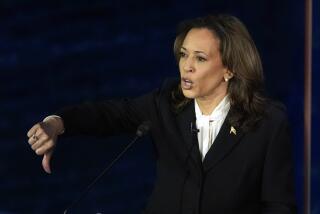Ukraine Pushing Poland’s Buttons
WARSAW — As snow and defiance blow through the mass demonstrations in neighboring Ukraine, Poles remember a generation ago when a man with a wild mustache and a worker’s pride ignited a revolution that transfixed the world and led to the fall of communism.
Poles have long enlisted in romantic crusades, and Ukraine’s disputed election between a Moscow-backed candidate and a pro-Western reformer has roused them over what they see as a dangerous, unfinished battle against vestiges of the former Soviet Union.
Poland has attempted for years to coax Ukraine from Moscow’s influence. Ukraine is a trading partner and a buffer between the east and Poland’s new place in the European Union. The prospect that an election widely viewed as fraudulent could give victory to the Kremlin-supported candidate, Prime Minister Viktor Yanukovich, has stirred the dogged Polish spirit and conjured a bit of nostalgia.
Legislators walk the halls of the Polish Parliament, wearing orange ties and ribbons to support the adopted color of Ukrainian protesters. Newspapers are full of impassioned editorials for peaceful change. And, like film footage retrieved from a dusty can, television images last week showed former Polish Solidarity labor leader Lech Walesa in Kiev rallying Ukrainians. His face was thinner, his mustache grayer, but his words possessed the familiar rhythm of rebellion.
“You are leading a very difficult struggle,” Walesa told tens of thousands of supporters of opposition candidate Viktor Yushchenko in Kiev’s Independence Square. “But I see by your enthusiasm that you are going to win.” He added: “I opposed the Soviet Union and I opposed communism, and I came out victorious.”
The Polish Parliament has passed a resolution appealing for a legitimate election. “History knows such moments, and we Poles know them, when the fate of a nation is being weighed. This moment has now come.”
Polish President Aleksander Kwasniewski has been attempting to negotiate a settlement but said there was a “realistic risk” that Ukraine could fracture into civil conflict.
“The situation in Ukraine is quite dangerous now,” said Paulina Szeszula, a 27-year-old secretary in Warsaw. “If the Moscow-backed candidate wins, it will be bad for Poland. It will mean Ukraine has gone eastern just as we’ve joined the European Union. This trouble in Ukraine should be an occasion for uniting all of Europe.”
History and bygone enemies don’t easily fade in Poland. Although it has improved its economy and secured its place in the West, Poland struggles with its geography and its violent legacy with Moscow.
Many Poles consider Russian President Vladimir V. Putin a wily holdover from the communist era. They say Russia is intent on instigating mischief in the former Soviet bloc to diminish U.S. and European influence.
Ukraine’s political turmoil was born of a democratic process criticized by many as flawed. It is different in many ways from the 1980s in Poland when Walesa, who would later be elected president, waged labor strikes in Gdansk against the communist regime.
The Polish unrest was one in a litany of developments that ended the Cold War and redrew the map of Europe. Poles see the Ukraine crisis as symbolic of that struggle, but one that also threatens the stability along their nation’s eastern flank.
“I don’t think we’ve yet to realize how important what’s going on in Ukraine is,” said Maciej Czumaj, a university student. “Ukraine is the last European country before Asia. They’re our neighbors, and whatever happens economically and politically in Kiev affects Poland. This was a sleeping problem now awakening.
“Ukraine needs a Walesa,” he added. “Maybe Yushchenko will be the new Walesa.”
A retired Polish military officer, who gave his name only as Tadeusz, said, “This reminds me of the Solidarity times. Ukraine wants to go west, but we know what Putin wants. He’s tough. Ukraine has to know they have to do this change on their own. If you do it on your own, with no interference from the outside, then it’s stronger. But if a shot is fired, there will be tragedy.”
Kwasniewski and other Polish politicians have been prominent in efforts to diffuse the standoff. It is another indication that Poland, which joined the European Union in May, may be a strategic diplomatic player as Europe expands toward an uneasy Russia.
Many Poles relish such a prospect: They have snapped up tangerines in support of the Ukraine protesters, and last weekend an orange shawl was draped over the main monument in Gdansk.
“A mass movement has emerged in Ukraine very similar to our Solidarity movement,” said Bogdan Borusewicz, a former Solidarity labor leader. “It doesn’t have a name yet, but we can see that a civic society has raised its head. Poles have a very important role to play in this because the pressure of our public opinion can save Ukraine from bloodshed.”
More to Read
Sign up for Essential California
The most important California stories and recommendations in your inbox every morning.
You may occasionally receive promotional content from the Los Angeles Times.











